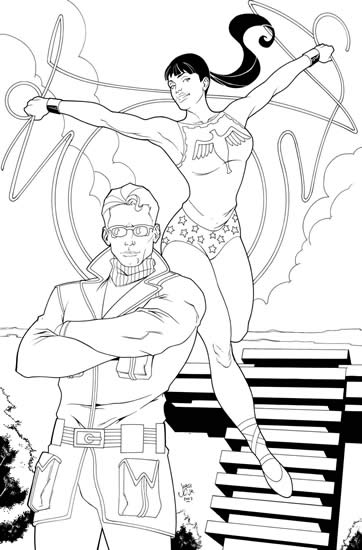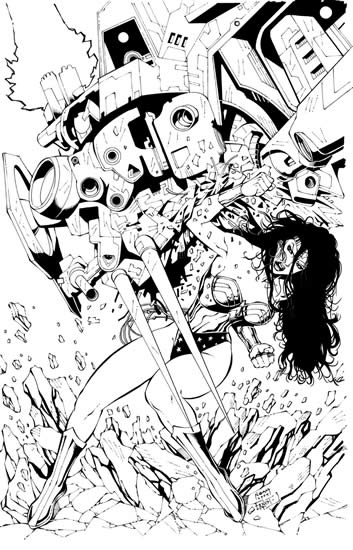Worlds of wonder
All right, we don't exactly travel. That's what the Postal Service is for.
Our first offering today comes to us all the way from Brazil — the land of Carnival, bikini wax, and Pelé. It's the latest entry in my Common Elements commission series, in which we challenge comic book artists to team up (or oppose, as they sometimes choose) unrelated superheroes who share some quality or characteristic in common.
This time, Brazilian artist Jorge Correa Jr. juxtaposes the vivacious youth of the original Wonder Girl, Donna Troy, against the hard-bitten cynicism of Simon Williams, better known as Wonder Man.

Wonder Man has always been one of my favorites among the plethora of second-tier characters who've populated Marvel Comics' all-star superteam, the Avengers, over the years. His superpowers are rather prosaic — he's incredibly strong and more or less invulnerable, and that's about it (although at various points in continuity, he has temporarily acquired other abilities as well, including the power to fly). Still, Wonder Man has a certain cool factor about him. Part of that comes from the fact that, in everyday life, he's a working actor and stuntman in Hollywood — a handy sideline for a guy who can't easily be harmed. Simon has also developed an amazing knack for being killed off and later resurrected, a feat he's accomplished on several occasions over the years. (During one of his "deaths," Simon's brainwave patterns were used to create the personality of the android Avenger known as the Vision.)
The coolest thing about Wonder Man, however, is his astonishing proclivity for wardrobe changes — not surprising, I guess, given Simon's acting background. Wonder Man has probably worn more different uniforms — at least eight or nine different variations — than any other male superhero in comicdom. (Simon's sometime-teammate, the Wasp, is even more notorious for her continual costuming makeovers.)
Like Simon, Donna Troy has undergone several changes in fighting garb since she debuted in the mid-1960s with the Teen Titans. (The T-shaped structure at bottom right in Jorge Correa's drawing is Titans Tower, the home of the modern-day version of that venerable superteam.) Today, Donna not only wears a dramatically different costume from her original one seen above, but she's also long since abandoned the Wonder Girl moniker in favor of her own real name. (In current continuity, Wonder Girl is a blonde teenager named Cassandra "Cassie" Sandsmark.) And, like Simon Williams, Donna Troy has been killed off a time or two, to later emerge stronger and more capable than ever.
While we're on the subject of Wonder heroes and heroines, let's take another trip abroad — this time to the Philippines, where we'll meet penciler Noah Salonga (known here as the artist on the Xena: Warrior Princess series published by Dynamite Entertainment) and inker Ernest Jocson (best known as the inking half of the artistic team on IDW's recent revival of Mike W. Barr's Maze Agency). Noah and Ernest pair up for this exciting battle scenario pitting my favorite Amazon against a nasty-looking robot assassin.

As I discovered when my family spent two years there in the mid-1970s, the Philippines enjoy a rich comic book history. The country's homegrown comics industry — called komiks in Filipino culture — has produced an incredible wealth of talent, a tradition that continues to this day. Salonga and Jocson are but two members of a new generation of Filipino comic artists emerging from the legacy of such legendary creators as Francisco Coching, Alfredo Alcala, Tony DeZuniga, Ernie Chan, Nestor Redondo, and a host of others.
Ah, the wonders of comic art: one of the simple pleasures that make the world a happier, more beautiful place.
And that's your Comic Art Friday.
Labels: Comic Art Friday









0 insisted on sticking two cents in:
Post a Comment
<< Home